Moving To London Alone — A Quick and Complete Guide for Newcomers
Moving to a new place on your own is an incredibly exciting experience. New places, new people, new food… The list goes on, and there’s plenty to be excited about. But it can also be a bit of a daunting experience — especially if you’re moving to a massive city like London.
London is a fantastic place to live, but whether you’re moving to London from within the UK or abroad, there’s a lot to learn before you make the big move.
But don’t fret, if you’re thinking of moving to London, you’ve come to the right place.
In this blog, we give you everything you need to know about moving to London alone. We’ve included tips on the best areas to live, how to find accommodation in London that suits your needs and budget, how to get around and more.
By the end, you’ll be well on your way to feeling like a proper Londoner.
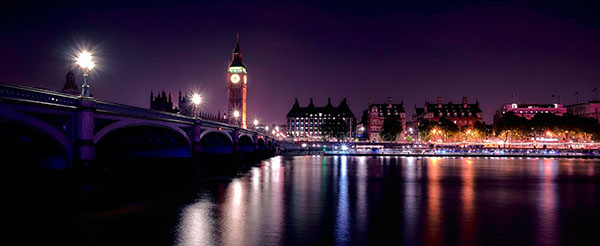
Getting Around — Transport in London
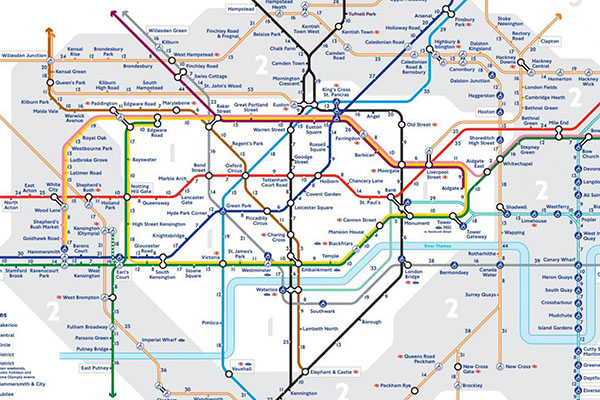
Moving to London alone is a big step but you can make things easy on yourself by doing a little bit of prep beforehand.
The first thing you need to know about London is transport. The easiest way to explain this is by zones. The tube map above shows all tube stations in zones one and two. This is a brand new map and also shows walking times in minutes between stations.
While the tube is usually the quickest way to get around London, there are also buses, trams and bikes available for the public to use. All public transport in London is contactless, and there are daily caps to charges that mean you can hop on and off and explore London and not have to worry you’re spending loads.
Bear in mind that it can be quicker to walk between some stations than to use different connections. The map above is great for newcomers to London and will save you lots of time as well as give you an overview of the underground.
If you’re moving to London for work, you’re most likely to be in zone one or two so it’s a good shout to familiarise yourself with the different stations and underground lines. It’s also worth downloading a tube app like the TfL Go app or Citymapper, which makes getting to grips with London transport easy.
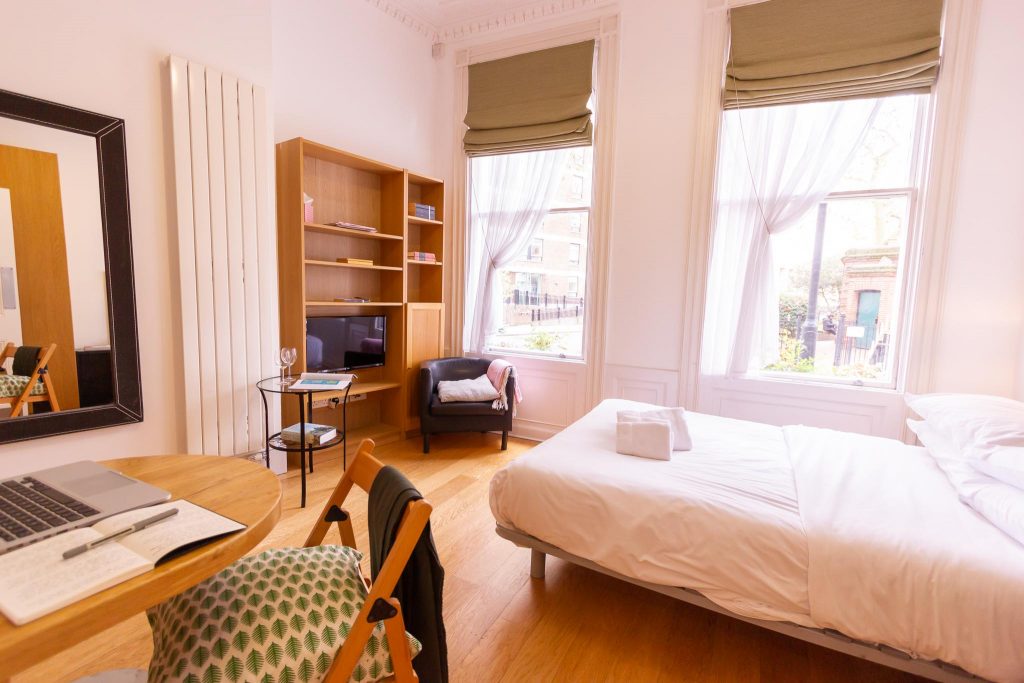
Find Your Own Studio Flat in London
Browse hundreds of furnishd studio flats for rent in London. All studios come with free WiFi, 24/7 maintenance and utilities included.
Claiming Your Spot in the City — The Best Areas to Live in London

If you’re moving to London alone, this is probably because you’re either ambitious in your career, in which case it will be good for you to socialise with your colleagues/work late nights, or you have a hankering for the bright city lights, a buzzing social life and all that goes with it.
In this case, you won’t want to spend all your hard-earned cash getting a taxi home late at night! So we’d suggest you look for accommodation in the same zone you’re working in.
We’ve researched the best areas to live in London with easy connectivity to the rest of the city and decided on the following:
Hampstead (Zone 2)
Hampstead has a bit of a village atmosphere right in London. It’s got loads of green spaces like Hampstead Heath, cool cafes, and an artistic community. It’s perfect if you love a mix of nature and a bit of culture. While it’s in Zone 2, it’s still only a short trip into Zone 1, so you get the best of both worlds and can enjoy a unique London experience.
Earls Court (Zone 1)
Right in the heart of West London, Earls Court is buzzing with life. It’s surrounded by iconic museums and cultural hotspots like Kensington Palace, The Science Museum and The Natural History Museum. It’s great for anyone who wants to dive into London’s history and culture. Plus, being in Zone 1, you’re just a quick trip away from everything else London has to offer.
West Kensington (Zone 2)
West Kensington is a bit of a hidden gem with its striking Victorian architecture and a quieter vibe. It’s a calmer part of London, but you’re still well-connected to the rest of the city. It’s a great area for anyone who prefers a more laid-back lifestyle with easy access to the action.
Learn more about the area in our West Kensington area guide.
Fulham (Zone 2)
Fulham is a great spot for anyone who likes to be close to the action but not too close. With lots of independent shops and riverside walks, it’s a good spot for both relaxing and exploring. But it’s only in Zone 2, so the city centre is just a quick tube journey away, meaning you get to enjoy both sides of London.
Bloomsbury (Zone 1)
Bloomsbury is a cultural hotspot that’s brimming with literary history and academic spirit. It’s got quaint squares, is close to loads of universities and the British Museum. Being in Zone 1, it’s a great area for exploring all of central London’s treasures and it’s close to King’s Cross which means travel around the UK and Europe is easy.
Learn more about living in Bloomsbury.
Pimlico (Zone 1)
Pimlico is a quiet area in the midst of London’s buzz. Known for its lovely streets and garden squares, it’s a bit of a retreat from the city’s fast pace. But since it’s in Zone 1, all of London’s excitement is just a stone’s throw away.
Euston (Zone 1)
Euston is perfect for anyone who’s always on the move. With one of London’s major train stations, it’s ideal for exploring the city and beyond. The area itself is exciting and filled with restaurants, cafes and loads of entertainment, making it a great choice for anyone looking to throw themselves into London life.
At Studios2Let, we have accommodation in all these areas and offer short and long lets. All our prices include electricity, water and council tax. Put together your moving to London alone budget, and you can include all these items under rent without getting a nasty surprise later.
Find Accommodation That Suits You — Accommodation Types in London
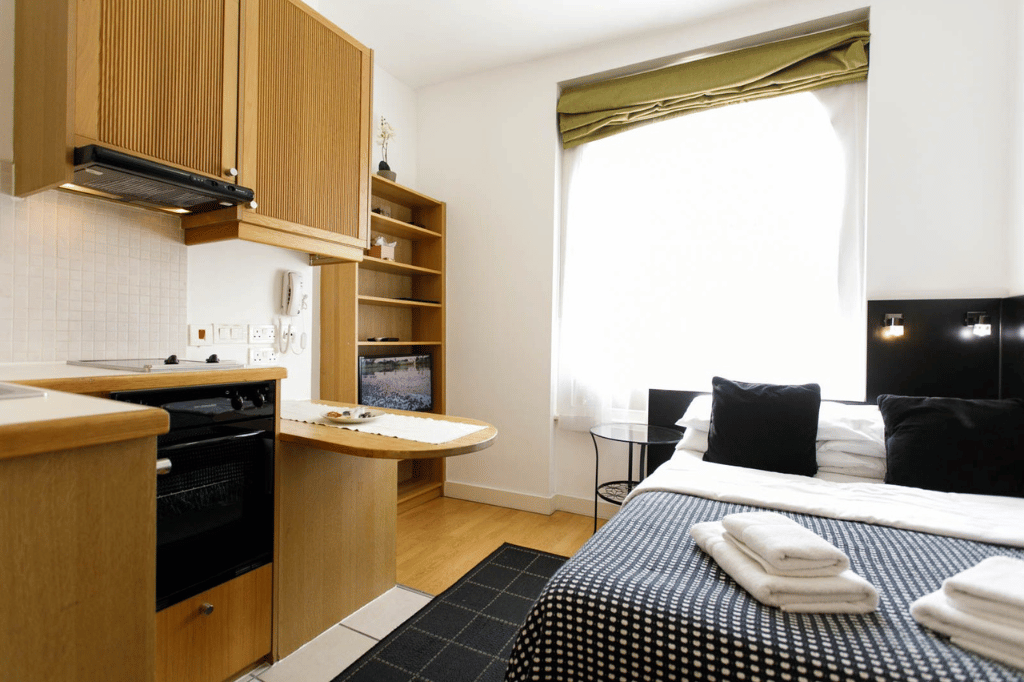
Choosing the right type of accommodation is crucial for an enjoyable experience when moving to London alone. The city’s wide range of living options caters to various lifestyles and budgets, whether you’re a student, professional, or just exploring the city.
Here’s a breakdown of the most popular accommodation types in London, along with their features, to help you find the perfect fit for your needs and preferences.
Private Studio Flats
A private studio flat is ideal for anyone who wants a bit of privacy and independence. Private flats offer a self-contained living space perfect for singles or couples. They usually come fully furnished with en-suite bathrooms, and a lot of them are all-inclusive, which means you don’t need to worry about utility bills. While they’re an affordable and easy-to-maintain option, the space can sometimes be limited in some properties.
Shared Flats/Houses
House sharing is a budget-friendly choice, giving you the chance to split costs and make friends with your housemates. This option is more of a communal living experience, which can be great for networking and making new friends. But a house share does mean sacrificing some privacy and can lead to tricky situations when it comes to shared responsibilities like cleaning and bills.
Serviced Apartments
Serviced apartments come with added amenities such as cleaning, maintenance services, and sometimes concierge services, making them ideal for anyone looking for a hassle-free living situation, especially for short-term stays. While they offer convenience and comfort, they tend to be pricier than other options and might lack the sense of community that comes with other options.
Renting a Room in a Family Home
Renting a room in a family home can be more affordable and provides a homely atmosphere, offering an authentic experience of local life. It’s a choice that can offer security and a sense of community. However, this option might come with restrictions in terms of privacy and independence.
Other Considerations for Moving to London Alone

There’s a lot to learn when you move to a new city, and you’ll be constantly learning when you move to London. This quick guide has given you a lot of what you’ll need to know when you first arrive, but there are a few other things that you should bear in mind:
Budgeting
One of the biggest challenges you’ll face when moving to London alone is managing the cost of living, which is notably higher than other parts of the UK and abroad. From food shopping to entertainment, everything comes with a slightly higher price tag in the capital.
It’s a good idea to create a budget that accounts for your accommodation costs, daily expenses, getting around, and some extra for leisure activities. Living in a city with so much to offer means it’s pretty easy to overspend, so having a budget is handy to keep your bank balance in check.
Meeting New People
Moving to a new city, especially as big as London, can sometimes feel lonely. Building a social network and finding like-minded people is key to making your move smoother and can give your mental health a massive boost.
London offers endless opportunities to meet people from all walks of life. Platforms like Meetup or local Facebook groups can be good starting points to find events and gatherings. It’s also worth researching special interest groups for any hobbies you have before you arrive in London.
Staying Safe in the City
Safety is an important consideration, especially when you’re new to a city. London, like any big city, has its share of safety concerns. It’s important to stay aware of your surroundings, especially when travelling at night.
Use well-lit and populated routes, and always let someone know your whereabouts. It’s a good idea to find accommodation with CCTV cameras and other safety features like secure entry points. If you ever feel unsafe, emergency services in London are quick and responsive, so don’t hesitate to contact them using 999.
Accessing Healthcare
Like anywhere in the UK, you’ll have access to the National Health Service (NHS), which provides a wide range of healthcare services. When you get to London, make sure to register with a local GP (General Practitioner) as soon as you arrive.
For emergencies, you can call 999, and for non-emergency medical advice, you can call NHS 111. Having health insurance can be helpful, especially if you are coming from outside the UK, to cover any specific healthcare needs not provided by the NHS.
Looking for more tips for living in the city? Check out our top ten tips for living in London.
Find Your New Home in London Today
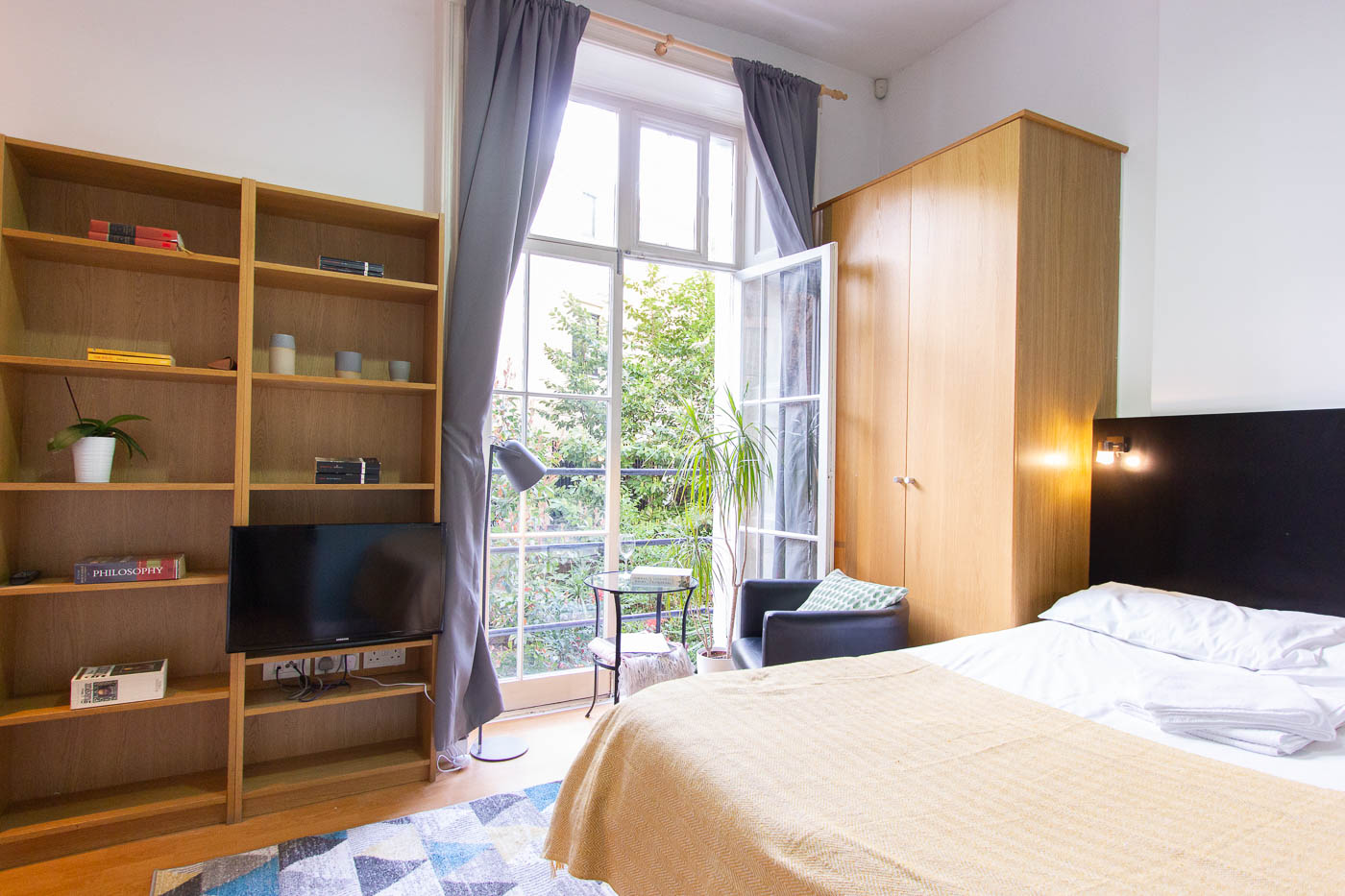
At Studios2let, we offer all-inclusive short and long-term accommodation in central London with everything newcomers need to settle in and feel safe and secure, including:
- CCTV cameras in common areas and entrances
- A secure fob key entry system
- An entry phone system with CCTV viewable through the TV
- Free wifi broadband internet
- Flat digital TV screens with selected SKY TV channels.
But that’s not all — our kitchens come fully equipped with an oven, cooker, fridge, freezer, microwave, pots, plates, cups and cutlery. We even have laundry facilities with a washer and dryer, so you don’t need to waste time and money in your local laundrette and can be in the comfort of your own studio while your washing gets done.
Our accommodation options are perfect for a huge range of people, from young professionals to those with plenty of experience. Our studio flats come in a range of sizes and are all-inclusive, which means that you get everything you need to settle into a new city, and you don’t have to worry about a long list of different utility payments. You just pay one payment a month, and you’re set. If you’d like to learn more about our studio flats in London or you’d like to book a viewing, please fill out the form below and we’ll get straight to work finding your new home in London.
For information on our apartments or help with booking your London accommodation please contact us on the form below.
